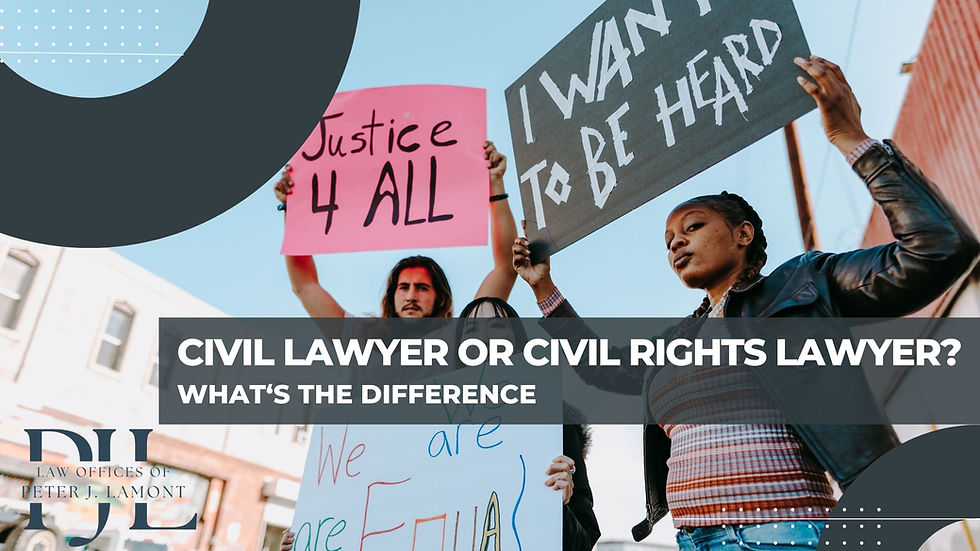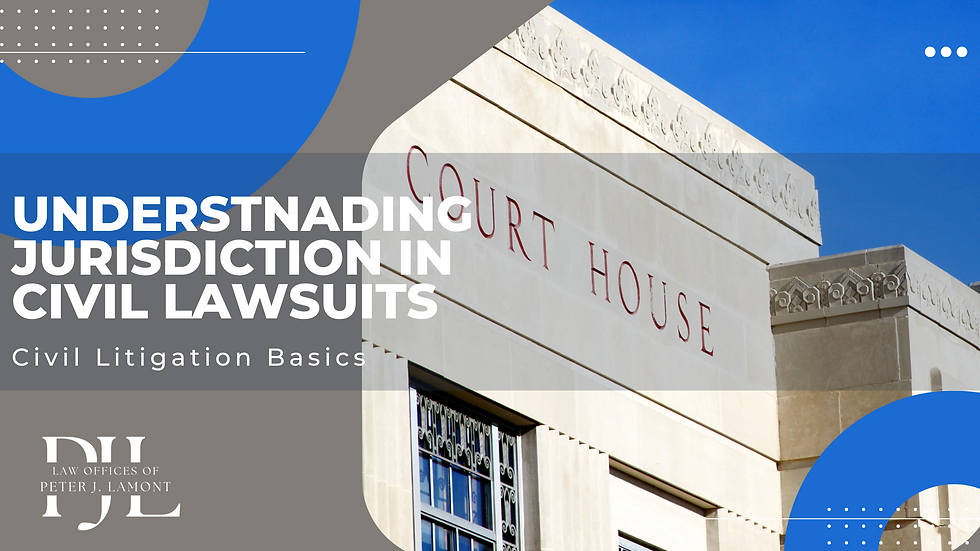Civil Lawyers vs. Civil Rights Lawyers
- Peter Lamont, Esq.

- May 6, 2024
- 5 min read
Understanding the Differences: Civil Lawyers vs. Civil Rights Lawyers

Introduction
Civil lawyers and civil rights lawyers often get mixed up due to their similar-sounding titles. However, they work in very different areas of law, each with distinct objectives and client groups. Let's explore the unique aspects of each to clear up any confusion.
What is a Civil Lawyer?
A civil lawyer is a legal professional who deals primarily with disputes between individuals or organizations that do not involve criminal charges. These lawyers cover a broad spectrum of legal issues, often involving disputes over money or property. Civil lawyers are the professionals you think of when you need to draft or review contracts, settle personal or business disputes, or handle matters related to estates and trusts.
Examples of Civil Law Cases:
Contract Disputes: A business hires a contractor to remodel their office, but the contractor fails to complete the work as agreed. The business may hire a civil lawyer to sue for breach of contract.
Property Disputes: Two neighbors might dispute the boundary lines of their properties. A civil lawyer can help resolve such disputes through legal documentation or court intervention if necessary.
Personal Injury: If an individual is injured due to someone else's negligence, such as in a car accident or through a defective product, a civil lawyer can help the victim claim compensation.
What is a Civil Rights Lawyer?
Civil rights lawyers focus on issues that involve the protection of freedoms and rights granted under the U.S. Constitution or federal laws. These attorneys are dedicated to ensuring that individuals do not face discrimination or unjust treatment based on immutable characteristics or their beliefs. They champion the causes that affect broader societal issues and work to uphold the principles of equity and justice.
Examples of Civil Rights Cases:
Freedom of Speech: If a journalist is censored or punished for their expressions or publications, a civil rights lawyer can help defend their right to free speech.
Police Misconduct: Victims of police brutality or wrongful arrest can seek the help of a civil rights lawyer to bring a lawsuit against the responsible parties and seek justice and compensation.
Key Differences Explained
1. Scope of Practice:
Civil Lawyers: They handle a wide range of issues that typically involve private disputes.
Civil Rights Lawyers: Their focus is on cases involving violations of rights protected by constitutions or laws.
2. Objectives of Cases:
Civil Lawyers: Often seek financial compensation or specific performance of a contract for their clients.
Civil Rights Lawyers: Aim to secure freedoms and rights, potentially influencing broader societal changes.
3. Types of Clients:
Civil Lawyers: Typically represent individuals, businesses, and other entities in private disputes.
Civil Rights Lawyers: Often represent individuals or groups facing discrimination or infringement of their fundamental rights.
Conclusion
While both civil lawyers and civil rights lawyers aim to uphold the law and ensure justice, they cater to different types of legal needs. Whether you are dealing with a personal dispute over a contract or property, or facing discrimination that impacts your fundamental rights, understanding which type of lawyer to consult can significantly influence the outcome of your case.
Contact us today to discuss your business or legal matter. Put our 20+ years of legal experience to work for you.
For detailed insights and legal assistance on topics discussed in this post, including litigation, contact the Law Offices of Peter J. Lamont at our Bergen County Office. We're here to answer your questions and provide legal advice. Contact us at (201) 904-2211 or email us at info@pjlesq.com.
Interested in More Legal Insights?
Explore our range of resources on business and legal matters. Subscribe to our podcast and YouTube channel for a wealth of information covering various business and legal topics. For specific inquiries or to discuss your legal matter with an attorney from our team, please email me directly at pl@pjlesq.com or call at (201) 904-2211. Your questions are important to us, and we look forward to providing the answers you need.

About Peter J. Lamont, Esq.
Peter J. Lamont is a nationally recognized attorney with significant experience in business, contract, litigation, and real estate law. With over two decades of legal practice, he has represented a wide array of businesses, including large international corporations. Peter is known for his practical legal and business advice, prioritizing efficient and cost-effective solutions for his clients.
Peter has an Avvo 10.0 Rating and has been acknowledged as one of America's Most Honored Lawyers since 2011. 201 Magainze and Lawyers of Distinction have also recognized him for being one of the top business and litigation attorneys in New Jersey. His commitment to his clients and the legal community is further evidenced by his active role as a speaker, lecturer, and published author in various legal and business publications.
As the founder of the Law Offices of Peter J. Lamont, Peter brings his Wall Street experience and client-focused approach to New Jersey, offering personalized legal services that align with each client's unique needs and goals.
DISCLAIMERS: The contents of this website and post are intended to convey general information only and not to provide legal advice or opinions. The contents of this website and the posting and viewing of the information on this website should not be construed as, and should not be relied upon for, legal or tax advice in any particular circumstance or fact situation. Nothing on this website is an offer to represent you, and nothing on this website is intended to create an attorney‑client relationship. An attorney-client relationship may only be established through direct attorney‑to‑client communication that is confirmed by the execution of an engagement agreement.
As with any legal issue, it is important that you obtain competent legal counsel before making any decisions about how to respond to a subpoena or whether to challenge one - even if you believe that compliance is not required. Because each situation is different, it may be impossible for this article to address all issues raised by every situation encountered in responding to a subpoena. The information below can give you guidance regarding some common issues related to subpoenas, but you should consult with an attorney before taking any actions (or refraining from acts) based on these suggestions. Separately, this post will focus on New Jersey law. If you receive a subpoena in a state other than New Jersey, you should immediately seek the advice of an attorney in your state, as certain rules differ in other states.
Disclaimer: Recognition by Legal Awards
The legal awards and recognitions mentioned above are not an endorsement or a guarantee of future performance. These honors reflect an attorney's past achievements and should not be considered as predictors of future results. They are not intended to compare one lawyer's services with other lawyers' services. The process for selecting an attorney for these awards can vary and may not include a review of the lawyer's competence in specific areas of practice. Potential clients should perform their own evaluation when seeking legal representation. No aspect of this advertisement has been approved by the Supreme Court of New Jersey.





Comments